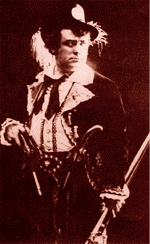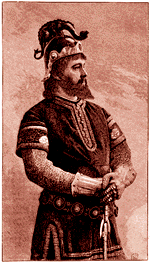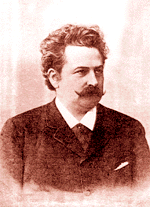
Autobiography
Memoirs (excerpts)
Brno – the first conductor
Estonia – Reval (Tallin today)
Leipzig – Staegemann
Three seasons on Rhine
Hannover – Hamburg
GALERIE
Recordings, Photos

12.1.1870 Rousínov by Rakovník – 25.9.1924 Senomaty, his mother country
In the world known as Carl (Karl) Burrian


Back then, Leipzig was the metropolis of the German music life and had no rival such as Berlin became later. First of all, the many important publishers, even world-famous ones, made Leipzig a music center, the Gewandhaus-concerts led by the most exquisite artists lend it a particular glory, and the municipal theaters run by Max Staegemann had their great tradition since long ago up to these days, when one cannot talk about any artistic ranks.
 When I introduced myself to director Staegemann, I could feel at once that I did not personally appeal to him. No wonder. I was twenty-two years old then, frail and scrawny with a hungry face, seventy centimeters around the chest, waist slightly better built, better than many of the Leipzig Misses. Rather a little student than a primo tenore amoroso or even eroico. And for the first time I sang Turrida at the new victorious Cavalleria, which could not have been missed. Miss Doxat was standing next to me with the powerful voice, and the old Schelper as a Roman wrestler. How I felt is difficult to describe because one has to feel it and above all go through it… The success was there, but not implicit. All the critiques – and I have kept them all – agreed in a sense that here is a figure of an exceptional talent, of a fiery temperament, with the musical endowment, but undefined, incomplete in progress. Professor Brandes, who is now at the Leipzig university, advised an immediate engagement in spite of all the aber and predicted that “about this young man we shall hear in the near future.” But Professor Brandes proposes and director Staegemann disposes.
When I introduced myself to director Staegemann, I could feel at once that I did not personally appeal to him. No wonder. I was twenty-two years old then, frail and scrawny with a hungry face, seventy centimeters around the chest, waist slightly better built, better than many of the Leipzig Misses. Rather a little student than a primo tenore amoroso or even eroico. And for the first time I sang Turrida at the new victorious Cavalleria, which could not have been missed. Miss Doxat was standing next to me with the powerful voice, and the old Schelper as a Roman wrestler. How I felt is difficult to describe because one has to feel it and above all go through it… The success was there, but not implicit. All the critiques – and I have kept them all – agreed in a sense that here is a figure of an exceptional talent, of a fiery temperament, with the musical endowment, but undefined, incomplete in progress. Professor Brandes, who is now at the Leipzig university, advised an immediate engagement in spite of all the aber and predicted that “about this young man we shall hear in the near future.” But Professor Brandes proposes and director Staegemann disposes.
 “You see, Mr. Burian,” Staegemann started out, seeking the right resonance of his voice a la Possart, “the two of us would not make a happy couple… Perhaps you have knowledge of who I am, perhaps you have heard of the baritone of Staegemann? (I nodded) Thus it must be a guarantee for you that an expert in tones talks to you, who regards as his duty to show the right path to the gifted young men and help them by advice and deed. Your voice! It is indeed the true, non-pretended Viennese opera voice of a beautiful sound as a silver string, a voice that under a suitable exercise and progress would open up a splendid career in the operetta for you, to which even your small, agile figure, your certainly non-classical face points out, not to mention the nose…You can never, I say never, be a dramatic tenor, there are the Gypsy barons awaiting you, but never Lohengrins.”
“You see, Mr. Burian,” Staegemann started out, seeking the right resonance of his voice a la Possart, “the two of us would not make a happy couple… Perhaps you have knowledge of who I am, perhaps you have heard of the baritone of Staegemann? (I nodded) Thus it must be a guarantee for you that an expert in tones talks to you, who regards as his duty to show the right path to the gifted young men and help them by advice and deed. Your voice! It is indeed the true, non-pretended Viennese opera voice of a beautiful sound as a silver string, a voice that under a suitable exercise and progress would open up a splendid career in the operetta for you, to which even your small, agile figure, your certainly non-classical face points out, not to mention the nose…You can never, I say never, be a dramatic tenor, there are the Gypsy barons awaiting you, but never Lohengrins.”
And so I left and cried bitterly…
In ten years I was the first heroic tenor at the Court Opera in Dresden that was – even Staegemann himself must have admitted – a first-rate opera, engaging only prominent artists. And then I get a wire from Leipzig once: “Could you substitute for Siegfried in Leipzig tomorrow, I am at a loss, six hundred marks for honorarium? Staegemann.”
“I am sorry, my honorarium is twelve hundred marks pro evening. Burian.”
And so I left and felt good! …
Senomaty, Märch 29th 1911, photo: Otto Schelper as Telramund (Lohengrin, oben) und Max Staegemann.
Literature: Burian K.: Paměti (Smetana, Praha, ročníky 1911 - 1912); Hradčanský J. V.: Komorní pěvec Karel Burian ve svých veršovaných dopisech (Graf. ústav L. Beneše, Český Brod, 193?); Hradčanský J. V.: Komorní pěvec Karel Burian ve svých veršovaných dopisech (Fr. A. Urbánek a synové, Praha, 1933); Burian E. F.: Karel Burian (Praha 1948); Novotný A.: Pěvecký portrét (Supraphon, Praha 1974); Wenig J.: Ema Destinová - Karel Burian (Supraphon, Praha, 1960); Nejedlý Z.: Dějiny opery Národního divadla I.-II. (Praha, 1949); Rektorys A.: Naši operní pěvci, (Praha 1958); Černý J.: Osmý den (Reflex, Praha, 6. 3. 2003)
Realisation: Boris Klepal, translation: Petra Mutlová
Thanks to Miloš Klepal and Alena Švecová.
Questions, Informatios, Responses